In this essay Jeff Ransom has written the first in a seven-part series illustrating the vision statements of Princeton United Methodist Church as described here:
“We aim to know God personally as Father, Son, and Holy Spirit. We glorify God in our words and deeds and celebrate God’s love. We are open to all of God’s possibilities. As God loves us, so we love one another.”
The New Year: talking with my (new?) self
Wow! Whew! ‘Twas a great Christmas season: The celebration of the Christ child, family visits, food, carols, concerts, pageants, kids’ excitement, charity to all, even football playoffs and cleaning up. I enjoyed good times, good fellowship, good deeds, good services, and (good gracious me) – my new year resolutions.
Speaking of my resolutions: Am I good with God, after all that I’ve been doing for family, friends, and others in the church? I think I’ve been loving God and neighbor this season, but what about that other part – loving myself? Doesn’t Luke 10:27 (“You shall love the Lord your God with all your heart, and with all your soul, and with all your strength, and with all your mind; and your neighbor as yourself.”) say my relationship with God, and with others, should be as meaningful as my relationship with myself? If so, this passage is not just about me not being selfish, but about me being more loving to me as a model for me loving my neighbor and God. That love means I’m to try to be a better Christian disciple. God already loves me so much: John 3:16 (“For God so loved the world that He gave His only Son, so that everyone who believes in Him may not perish but have eternal life”).
Then how can I be more loving of myself so I can grow as a disciple?
Well, let me take stock of my “disciple checklist”: I listen to the sermons, give my time and money, serve on a committee or two, do community service, love and support others and my family. Am I missing anything in my “loving me by what I do” duties?
By now you have probably figured out that I’m talking about improving my spiritual growth, and becoming a mature Christian. To grow, I need to challenge myself. If I look at Jesus’ command in Matthew 5:48 (“Be perfect as your heavenly Father is perfect”), I realize there is no comfort in Christ from coasting, or resting at, where I already am.
The bottom line: I need to deal with two things: my sin, and my service – fighting the former, and growing the latter. Both are addressed by Jesus through the gospels, and by Paul, in his letters. According to Jesus and Paul (and for Methodists, John Wesley), I can’t make any progress by my own efforts. While the right next step is to seek the only capable helper, the Holy Spirit, my human-ness (reluctant to yield control) resists my inviting that help. Alone, I seem to restrict my own access to the Holy Spirit.
Because I can’t seem to manage this individually, I really need a love-binding community — a church community — of those in a similar condition. In such a community we can help each other to connect with the Holy Spirit and overcome our personal obstacles. Yet fear of exposing my “private issues” to others keeps me isolated, unable to move forward on my spiritual journey.
Is Princeton UMC not a trusted community where it is “safe” for me to take that next step? Well, No . . and Yes!
The NO answer: At the Sunday corporate worship service, or in the typical functional committee meeting, the church may offer a heart-warming or head-inspiring growth for the prepared disciple, but it just doesn’t seem to be the right “bare-your-soul space for spiritual changes” toward Christian maturity. The result: conversions of nominal or non-Christian persons do not often happen here. Don’t agree? Ask yourself, except for youth confirmations, how many professions of faith happen at PUMC ?
The YES answer: PUMC is exactly the right spot for me if I am in a small group that uses daily intercessory prayer and discretionary support of confessions for its members. I would have the accountability, caring and learning environment I need to commit myself to be a new creation, someone with an intimate relationship with God. If we invite others to join the groups, and seek to encourage new leaders, small groups could also provide a vital engine for church growth.
My conclusion: I should either start such a small group, or work toward revitalizing an existing small group.
If you conclude this is a personal message of resolution for its author, you are correct. Now go through it again with “you as the me.” Make it your own story to see if any of it resonates with your own discipleship path. See if you agree that, together in a small group, we could each be better disciples.
The Small Group Ministry at PUMC will look at existing small groups. More than 40 meet the minimal definition (hint: they’re groups which are . . small). Our principle was stated by Jesus in Matthew 18:20, “For where two or three are gathered in my name, I am there among them.” Many of us — including our annual conference leaders– believe our church and personal growth depends upon vital small groups.
Early this year PUMC will set up small group facilitator training and coaching support to help existing small groups aim to be more vital. We will also establish new vital small groups, either study- and/or mission-oriented, which follow the small group health guidelines for praying, caring, reaching out, and empowering. Let me know if you you’re interested. Let’s grow together!
Jeff Ransom, Lay Leader

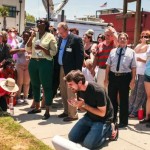
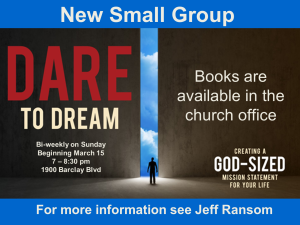
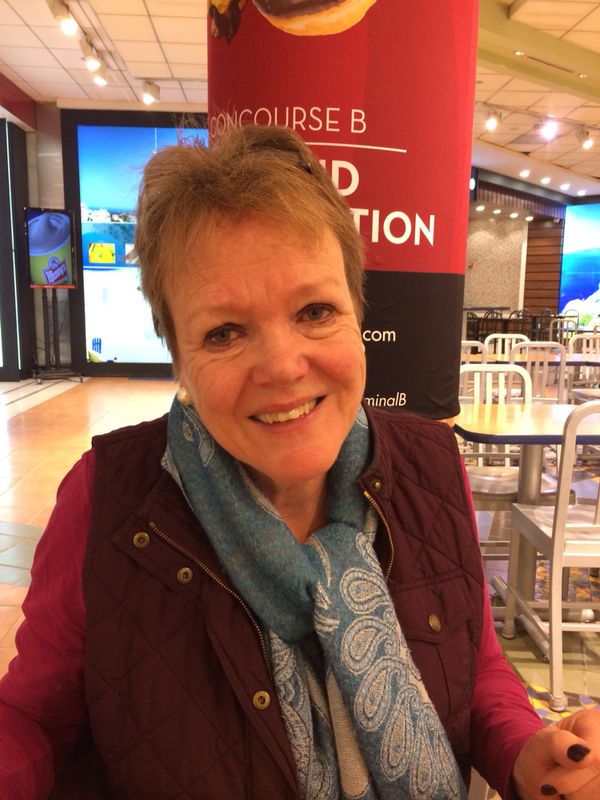
 coming, but you can decide which ones to surf. Karin spoke at the March breakfast, served by the United Methodist Men, on Finding Inner Resilience to Meet Life’s Challenges.
coming, but you can decide which ones to surf. Karin spoke at the March breakfast, served by the United Methodist Men, on Finding Inner Resilience to Meet Life’s Challenges. 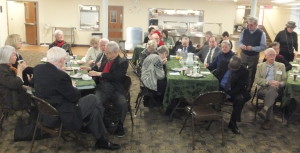 Karin trained as a trauma, abuse, and grief recovery counselor, and her insights were so valuable that everyone asked for the power point notes.
Karin trained as a trauma, abuse, and grief recovery counselor, and her insights were so valuable that everyone asked for the power point notes. 
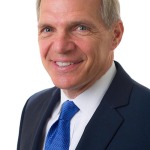
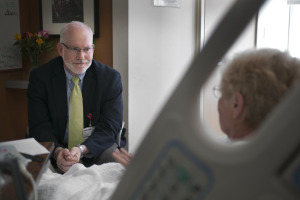 Many of life’s critical moments take place in a healthcare setting. For most of us the bookends of our lives – birth and death – take place with the support of a medical team outside the home. With more attention now on patient-centered care, other healthcare team providers are being recognized for the roles they play at these crucial times.
Many of life’s critical moments take place in a healthcare setting. For most of us the bookends of our lives – birth and death – take place with the support of a medical team outside the home. With more attention now on patient-centered care, other healthcare team providers are being recognized for the roles they play at these crucial times.